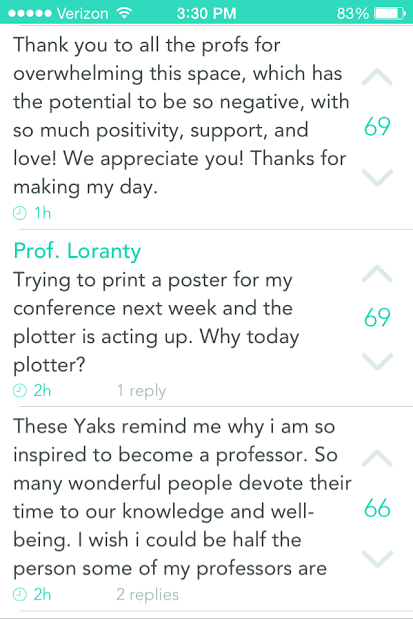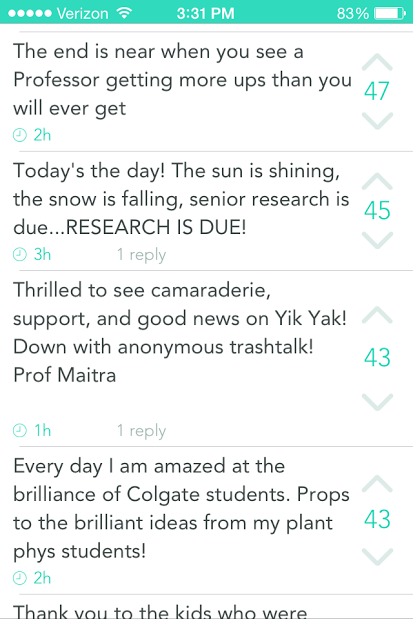You have /5 articles left.
Sign up for a free account or log in.
In the stressful final days of a long and trying semester, Colgate University professors wanted to spread some love. To get the message across, they turned to a social media scene frequented by students but foreign to many professors.
They set out to take back Yik Yak by flooding the anonymous social media app with happy thoughts.
Yik Yak -- like the many “confessions websites” before it -- is associated with campus-specific hateful comments and cyber bullying.
“It started there, and we wanted to end it there,” said Eddie Watkins, an associate professor of biology at Colgate.
Racist comments on Yik Yak were responsible in part for tensions at Colgate in September that led a group of students to stage a multi-day sit-in to protest the university’s lack of diversity. Insulting -- and at times threatening -- comments reappeared on the app's Colgate page (and elsewhere) in recent weeks as people across the country have organized to protest grand jury decisions in the deaths of Michael Brown and Eric Garner at the hands of police.
During the September sit-in, associate biology professor Geoff Holm knew faculty members who posted tried to spread some Colgate campus love on Yik Yak. But individually, their comments weren’t very influential.
He thought a unified effort to spread positive thoughts would be more effective, and he suggested the idea last week to a few friends who are faculty members. “If Yik Yak is really going to be a driver of campus culture, we need to be a part of that,” Holm said.
More than 50 professors posted comments through the app on Friday, the last day of classes. Posts from faculty members ranged from quoting Herman Melville and Voltaire to challenging other professors to see who could build up the most active Yik Yak account.
Most, though, offered well wishes for students as they started finals and appreciation for students’ hard work throughout the semester.
“Thanks to the students at Colgate for making my job fun. I’m sorry I can’t always return the favor, but you know I love ya,” one post from a user named Prof Woods says.
Another reads: “Bordeaux’s Study Tips 1. Real food. The brain can’t function properly on simply carbs and stimulants. 2. Get off social media and study already. (After you upvote my yak, of course.)”
Watkins said he was a bit worried that students would overwhelm professors' efforts to turn Yik Yak into a force for social good by responding with rude comments. Instead, replies called the faculty takeover “dope” and “amazing.”
“To all the professors, thank you. What a wonderful, happy thing to wake up to in the morning. You made mine and many other students’ days,” one post reads.
Outside of the virtual world, students on campus also seemed to enjoy the professors' comments, said Watkins, who heard feedback from students in the hallways and at the student center.
“Students are loving it,” Watkins said. “They’re shocked. They had no idea we even had phones, I think."
Professors didn’t have any rules about what to post, other than an encouragement to keep things positive and to identify themselves.
“People should stand behind what they say, or else they shouldn’t say it,” said Watkins, who suggested to other faulty members that they use their names when posting.
Watkins said that while some professors may continue to post on Yik Yak, he doesn't expect all his colleagues to turn into frequent users.
But that wasn't the point of the take-back. The idea was to highlight all that’s good on campus while showing students the power that even posts on an anonymous app can have over the mood on campus.



